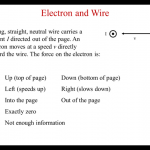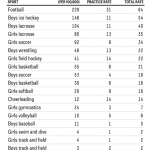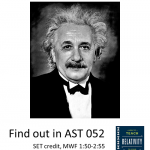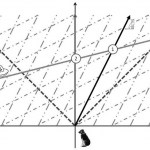
A little while back, I was put in touch with a Wall Street Journal writer who was looking into a new-ish health fad called "earthing," which involves people sleeping on special grounded mats and that sort of thing. The basis of this particular bit of quackery is the notion that spending time indoors, out of contact with the ground, allows us to pick up a net positive charge relative to the Earth, and this has negative health consequences. Walking barefoot on the ground, or sleeping on a pad that is electrically connected to ground via your house's wiring, allows you to replace your lost…
I've had a lot of weird things happen in the time I've been teaching, but the above image is my new favorite message from a student. We gave an exam Thursday night, so a couple of my colleagues canceled class on Friday, but I'm going to be at DAMOP the last week of class, so I want to get a little bit ahead to reduce the amount of stuff other people have to cover for me. So I had a class as usual.
All but two of the students showed up, which either means we terrified them with the exam, or they actually like the class. And, actually, there was only one student who didn't show up at all-- the…
Here's some stuff I've had open in Chrome for a while, and want to close before we go out of town for the weekend:
-- Statistics on the professionalization of science blogging, a topic I have banged on about in the past. Nothing really new, but nice to have it somewhat quantified.
-- Speaking of quantifying things, this New York Times piece on metrics is less stupid than I expected. Which is about as high as praise is likely to get for op-eds on this subject.
-- If I didn't get bored with topics after a while, I could just write endless responses to pieces about the state of science…
That recent study on active learning continues to generate some press, including a new interview with Carl Wieman about why traditional lectures are problematic. Wieman is pretty blunt about his opinions on the subject, which will come as no surprise to people in the AMO physics community...
Anyway, while most of the rest of the academic nation is into final exams and even graduation parties, we still have two more weeks of class after this one, and we're giving an exam tonight in my intro E&M class. Which means I'm still spending a lot of time thinking about this stuff. Some related…
Rhett and I did the 15th episode of our Uncertain Dots hangout yesterday, commenting on a discussion started by Casey Rutherford about what we would like students coming into college physics to know. We had a slight difference of opinion about physics content, but agreed about the importance of algebra (which is like sunscreen).
I had meant to post this last night, but SteelyKid has made friends with the kids at one of the houses behind ours, so I spent a good chunk of the evening making sure she didn't climb over the fence into their yard. So, instead, you get to wake up with our physics…
While solo-parenting Sunday night, I still managed to get free of The Pip just barely in time to catch the start of Cosmos. This was a strange episode in a couple of ways, chiefly having to do with the selection of topics.
For one thing, there's no small irony in the fact that following a couple of weeks in which host Neil deGrasse Tyson has been raked over metaphorical coals for dismissing philosophy as pointless because it doesn't lead to testable predictions, a big chunk of the episode was given over to wildly impractical speculations about panspermia and related topics. I realize it's…
Every now and then, I run across a question in class that I genuinely don't know how to answer. If I'm lucky, this happens when I'm prepping a class, rather than when a student asks it live. Like today, when I noticed the above discussion question in my slides (reproduced at the bottom as well for those reading via RSS).
The discussion question itself is perfectly straightforward-- the current in the wire creates a magnetic field, the moving electron interacts with that, and getting the direction of the force is a straightforward right-hand-rule problem. I'll pose this to the class and ask…
Kate's arguing a case in Connecticut today, so I was solo-parenting last night and this morning. which means that while I did manage to watch Cosmos last night, and have some thoughts about it, I don't have the time or energy to write them up this morning. As explanation, I offer this video from dinner last night, in which SteelyKid and The Pip explore subtle issues of plant biology:
As you might guess, it's very trying to deal with such sullen and mopey children all the time...
This was also on the heels of a classmate's birthday party with SteelyKid on Saturday, which was preceded by two…
A couple of weeks ago, io9 ran a piece about the old accusations that Robert Millikan manipulated his data for the electron charge with the headlineDid a Case of Scientific Misconduct Win the Nobel Prize for Physics? that got a lot of attention. I wasn't as impressed with this as a lot of other people, mostly because it's mostly just adding a clickbait headline to a story that's been around for decades, and doesn't even really engage with the various responses and defenses of Millikan, including this PDF that offers a (to my mind) fairly convincing argument that most of the argument turns on…
Over at Xykademiqz, a couple of weeks ago, there was a very nice post about the struggle to get students to write. "Very nice" here means that it's a good description of the problem, not that I'm glad anybody else has to deal with this.
I don't face quite the same thing-- my students generally aren't writing research papers for journals-- but getting senior theses written is often a bit of a chore. And I admit, I'm really bad about pushing students to do this in a systematic way. The problem is that, as I know from personal experience back when I was an undergrad and saber-tooth tigers…
One of the very best treatments of the scientific method in fiction that I've read-- I suspect it may be the best, but years on the Internet make me want to hedge everything-- is the Steerswoman series by Rosemary Kirstein. The main character, Rowan, is a Steerswoman, a member of an order dedicated to collecting and sharing knowledge of the quasi-medieval world in which she lives, and over the course of four books she puzzles out some amazing things about the secret origins of her world and society. It's a joy to watch the scientific reasoning process Rowan follows, and the plots have plenty…
Another week, another hangout with Rhett. In which we actually fielded a couple of questions from readers on Twitter, about the reason for inertia and a kind of meta-question. More audience questions would, of course, be welcome.
A couple of links to things that came up:
Mach's Principle, a past attempt to explain the origin of inertia.
Newton's famous refusal to explain gravity, "Hypotheses non fingo." Sir Isaac was second to none in his mastery of snotty condescension.
Veritasium's buoyancy quiz.
Aatish Bhatia's post about a new meta-analysis of "active learning" studies showing that…
I've been setting up schedules with my summer research students lately, and the main constraint we're facing with that is that I'm going to spend most of August in Europe. Part of this is pure vacation-- Kate and I are going to the UK for a couple of weeks. Part of it is the World Science Fiction Convention in London, in the middle of that trip, where both Kate and I expect to be on programming (though there aren't any set items this far out). And the last bit has just been officially announced: I'm speaking at the Nordita Workshop for Science Writers organized by Sabine Hossenfelder from…
Last night's episode of the Cosmos reboot focused on one of the three physicists whose pictures Einstein kept in his office: Michael Faraday. I'm a big fan of Faraday, who famously started his career as a bookbinder's apprentice reading the books brought into the shop, and ended as one of the greatest experimental physicists of the 19th Century. Also, he had magnificent sideburns, as you can see in the picture. It's a great story-- I highly recommend his biography-- and pretty much the entire episode was devoted to Faraday, with only a surprisingly tenuous astronomy connection at the end,…
Over at Five Thirty Eight, Walt Hickey has a piece about cheerleading as a sport and injury rates, which is both a nice look at the way to use stats to measure the real danger level of an activity, and the sort of small details that can be teased out. The piece includes a table of injury rates for a wide variety of sports, seen above as the "featured image" and reproduced below. I don't really have anything much to say about cheerleading, but one thing did jump out at me from the table, leading to the question in the post title.
this table show concussion rates in competition and in practice…
Last weekend, the circus came to town, and Grandma and Grandpa came up to help us take the kids. We took SteelyKid a couple of years ago, and figured The Pip was old enough to go this time, too. Having bought tickets a couple of years ago, I got sent a pre-sale offer link, and followed that to get tickets in the front center section.
What I didn't realize was that these put us in the "Circus Celebrity" section-- when the show started, they came and gave us these ribbon things to wear, and a bit before the intermission some of the performers came over to our section, and led us out to the…
This coming fall term, I'll be teaching Astronomy 052, "Relativity, Black Holes, and Quasars," because the guy who has traditionally taught it (a radio astronomer who studies active galactic nuclei) has to do other courses instead. But I said "Well, hell, I've written a popular audience book explaining relativity. I can teach that." And since I get to make teaching assignments (the one and only positive feature of being department chair), well, I put myself down to teach it. Now, of course, I find myself thinking about ideas for that class, months in advance, when I ought to be working on…
I've seen a few links passed around to this Tom Siegfried post about science literacy, which is mostly a familiar story about how polls show most Americans giving incorrect answers to science questions. The sort of stuff you find in the NSF's Science and Engineering Indicators report. What's getting the social-media attention, though, is this paragraph near the end:
In fact, I’d contend (and have contended) that the problem with science education is not that it fails to inculcate enough facts, but that it tries to inculcate too many. Science classes in high school and intro classes in…
We had a couple of weeks of unplanned hiatus due to sick kids and day care closures, so the superstitious among you might've thought we would never get to the 13th episode of Encertain Dots. Rhett and I are scientists, though, so we powered through:
Given the time of year, this is mostly about end-of-academic-year stuff: exams, intro course curricula, and undergrad research. The undergraduate research symposium I mention a few times is the Steinmetz Symposium, a Union tradition that will happen for the 24th time this Friday. This cancels a day of classes, which is a little annoying, but it's…
Last week's talks were using sci-fi space travel as a hook to talk about relativity, and my original idea for the talk was to explain how faster-than-light travel ultimately ends up violating causality. Some observers will see effects happening before the events that cause them, and that's just weird. In How to Teach Relativity to Your Dog, the illustration I use is a stationary dog watching a cat moving by at half the speed of light and a space alien zipping past at four times the speed of light. In that scenario, the dog can hand a water balloon to the passing alien to soak the cat, and…







